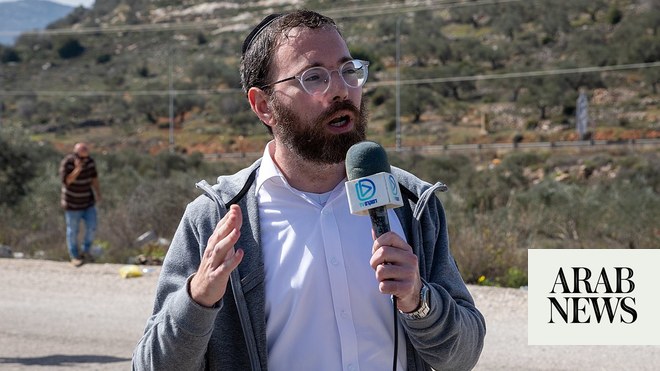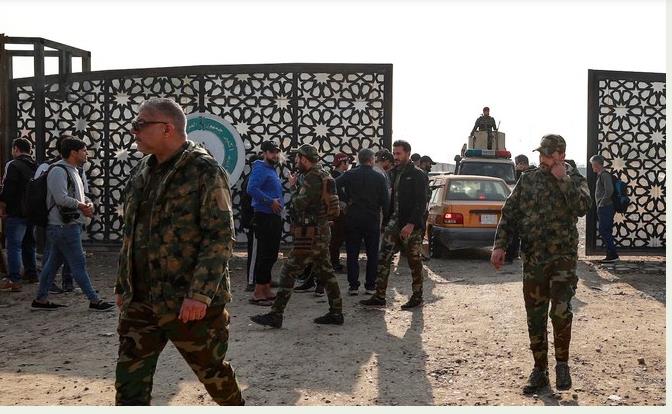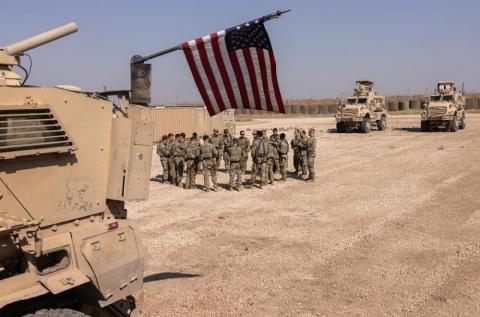
October 2019 marked the beginning of the biggest grassroots social movement in Iraq’s modern history
Kataib Hezbollah, Asaib Ahl Al-Haq and other pro-Iran militias crushed the protests through murder and intimidation
IRBIL/BOGOTA: Mustafa Makki Karim, 24, fled Baghdad for the relative safety of Iraq’s semi-autonomous Kurdistan region last year following a spate of death threats by pro-Iran groups for his role in the protest movement that erupted against government corruption and incompetence in October 2019.
During the unrest that followed, the young activist earned the moniker “Joker” for the clown mask he wore to hide his identity as he and his “Armored Division of Tahrir” defended their camp in Baghdad’s Victory Square.
“I left my life, my family, my friends, my future for my country and for the souls of the people we lost,” Karim told Arab News from the safety of his Irbil bedsit. He took a bullet in his leg and lost sight in one eye after Iraqi troops fired birdshot into the crowd.
Now Karim and others like him have been forced into hiding — nursing injuries he sustained in clashes with security forces and militia thugs, fearful for those who chose to remain behind.
Their fears are hardly unfounded. On May 9, Ihab Al-Wazni, a coordinator of protests in the Shiite shrine city of Karbala, was killed outside his home by men on motorbikes. A vocal opponent of corruption and Iran’s influence in Iraq, Al-Wazni was a key figure of the protest campaign.
October 2019 marked the beginning of the biggest grassroots social movement in Iraq’s modern history. Fed up with a corrupt ruling elite, seen as beholden to foreign powers, the young Iraqis who came of age following the fall of dictator Saddam Hussein marched in their hundreds of thousands in cities across the country, demanding the overthrow of the post-2003 order.
Scenes of defiance played out in Baghdad’s Tahrir Square, with pitched battles between protesters and security forces on the adjoining bridges leading to the fortified Green Zone, where government officials and foreign diplomats watched with unease.
Around 600 people were killed as a result of their association with the protest movement — many on the streets during rallies, others targeted on their doorsteps away from the rallies.
According to Amnesty International, the global human rights monitor, hundreds of people were killed by live ammunition, military-grade teargas canisters and other weapons deemed inappropriate for civilian crowd control. Many soldiers and police officers were wounded by lumps of concrete and petrol bombs thrown by protesters.
“I started to protest to end this corrupt political class,” Karim told Arab News. “My life was totally changed by the protests. I was a university student. I celebrated graduation in Tahrir Square. I used to go from Tahrir to my university to do my exams and then go back to the demonstrations.”
The iconic clown mask, popularized by the 2019 US crime thriller “Joker” starring Joaquin Phoenix, has cropped up in protests across the world as a symbol of rebellion against indifferent and sneering elites.
Pro-Iran media outlets in Iraq even labeled the young protesters “joker gangs” and accused them of receiving support from the US to overthrow the Iraqi state. The reality of course was that key branches of the Iranian regime had unleashed their paramilitary proxies on the protesters to maintain their stranglehold over Iraq.
“I used to hide my identity. For a few months, no one knew I was the Joker. But my uncle told the militias about me. He was with Saraya Al-Salam,” Karim said, referring to the Mahdi Army, the erstwhile militia led by the Shiite cleric Muqtada Al-Sadr.
“Suddenly I was a wanted man at checkpoints and there is a court case against me by Asaib Ahl Al-Haq,” he added, alluding to an Iran-backed militia known to have deployed fighters to Syria in support of the Assad regime.
“The names and pictures of me, my brother, and my cousin were on the street. They were placed there by Asaib Ahl Al-Haq. Our house was attacked with bullets.”
Rather than back down, Karim removed his mask. “I took the decision to reveal my identity on TV. I told them who I am and what I do. I and others were on the front line to stop forces who wanted to break into Tahrir Square.”
After initial successes, including the resignation of then-Prime Minister Adel Abdul-Mahdi, and having earned widespread international sympathy, the movement began to fragment.
Bereft of clear leadership, divided on strategy, and intimidated by heavy-handed policing and political assassinations, the final nail in the movement’s coffin was the coronavirus disease (COVID-19) pandemic.
On the first anniversary of the “Tishreen revolution” in October 2020, Karim and other activists still camped out in the square attempted to re-energize their dwindling movement. But their attempts to march on the Green Zone were foiled by security forces who retook Tahrir.
With the rebellion quashed by pro-Iran forces and an elite determined to hold onto power at any cost, those who had taken part and openly criticized the all-powerful militias now faced retribution.
As assassins picked off the protest leaders one by one, Karim knew he had to flee. Even his family were forced to move to a different city to avoid collective punishment.
“The militias have called for my death. There is no way I can go back to any Iraqi cities outside Kurdistan,” he said. “I don’t have any future here in Iraq. All militias are chasing me, specifically Kataib Hezbollah and Asaib Ahl Al-Haq. They want to kill me.”
And the threats are very real. Thaer Karim Al-Tayeb from Al-Diwaniyah, a town just east of Iraq’s shrine city of Najaf, was mortally wounded by a car bomb for his role in the movement.
“His dream was to have a job with the ministry of oil and to get married to his girlfriend,” Al-Tayeb’s brother Malik told Arab News. “But the militias assassinated him with an explosive device that was put in his car on Dec. 14, 2019.
“He stayed in hospital for nine days before he died. We don’t know who targeted him. We don’t have evidence of who did this. I even met with the prime minister, the minister of interior and the governor of Diwaniyah and security commanders. There were no results. Only fake promises. Instead, I received threats.”
Justice for Al-Tayeb, it seemed, was simply out of reach. “After the death of my brother, a man with his face covered approached me on a motorbike,” said Malik. “He told me that I needed to stop pursuing the case of my brother’s death.”
Few doubt an Iranian intelligence connection to the campaign of suppression and intimidation, which uses the tactics deployed by Tehran against protesters when they dare rebel.
“Militias and the countries that support them want to create chaos in the country,” said Ahmed Latif Taher, another Iraqi youth forced to flee to the Kurdistan region. “We know the government and the militias are the same.”
But fighting the pro-Iran militias head-on would prove disastrous, he told Arab News. Instead, he wants the international community to keep up the pressure on the Iranian regime so that it ceases its extraterritorial activities in Iraq and elsewhere in the region.
“We don’t want to have an armed revolution in any way that will destroy the country. It will be another Syria here. We don’t want that,” Taher said. “They have enough weapons to exterminate the people. They would kill to stay in power. We need a UN intervention to pressure Iran to take its hands off the region.”
As Iraq grapples with a fresh COVID-19 wave, with an economy and infrastructure left shattered by decades of war and mismanagement, the grievances of the protesters remain unaddressed.
“I do not regret my participation in the demonstrations,” Karim said as he scrolled through photographs of his masked alter ego on his phone, decked out in body armor in Tahrir Square.
“There is more awareness among people in Iraq after the demonstrations. Day after day we win people over to our side. Even people who work for the militias.”












